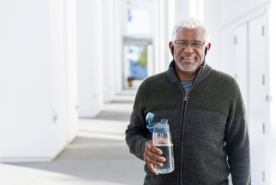Prevention, daily life, and wellbeing Mental health and wellness Self-management and self-care Coping and self-care
May 15, 2017
By Christen Perry, LCSW
Satellite Healthcare
Chronic kidney disease does not discriminate based on gender or age, and the effects vary from person-to-person. There is no single face to the disease. Chronic kidney disease (CKD) is an ‘invisible disease’ with limited to no outward signs, and yet, its considerable effects can dramatically alter the day-to-day lives of those with the disease.
Too often, those with CKD and/or on dialysis are faced with a common refrain – “You don’t look sick.”
This statement can sometimes feel like an insult or an invalidation of the effects of the disease and all you are going through.
Rest assured, the effects of CKD are real, and despite efforts to manage the disease, your symptoms will wax and wane. Overcoming your symptoms is not a simple case of ‘mind-over-matter’.
How you feel about and respond to statements like “You don’t look sick” depends on many factors:
What you think was meant
A simple statement like “You don’t look sick,” while often intended as encouragement or a compliment, can carry unintended consequences. Consider this statement may be a greater reflection on the person who said it than it is on you. It may be an attempt of them to protect against their sense of helplessness.
Comments like this may lead you to wonder whether you are overreacting to symptoms or question if you are trying hard enough to manage the disease. Do not let a comment like “You don’t look sick” diminish your daily struggles and victories of managing CKD.
Consider the relationship to and/or significance of the person who made the statement.
Who told you “You don’t look sick?” Was it a family member, close friend, co-worker, acquaintance or a stranger?
- To what extent do you value this person’s opinion and this relationship?
- Are you looking for this person to be a better source of support for you?
- Is it worth your effort to enlighten them about CKD and/or dialysis?
- And lastly, do you believe this person will be receptive to being educated about CKD to gain a better perspective on how you feel?
If the answer to any of these questions is ‘yes,’ then this is an opportunity to educate this person about how you and others with CKD may look on the outside versus how you feel on the inside. Make them aware that common CKD symptoms leave you feeling drained and can make normal, everyday activities a challenge. Help them understand CKD can contribute to or exacerbate other health conditions, and how symptoms are not always linear, meaning some days are better than others. In the end, consider whether this person’s understanding of CKD can contribute to your physical, mental and/or emotional well-being before undertaking efforts to enlighten them.
Your current quality of life
Those who live with the realities of managing their CKD understand that multiple factors are at play. Maintaining a positive outlook and good quality of life can prove difficult. Following prescribed dialysis, taking medications, eating a renal-healthy diet and controlling fluids represent only a few aspects of life with CKD. Work, family and financial obligations must also be factored in. However, in the midst of juggling all of life’s responsibilities, never forget that your quality of life is the key to protecting your sense of self, and warding off feelings of hurt, isolation and hopelessness that may surface as a result of a comment like “You don’t look sick.”
Your feelings of self-worth
Your sense of self-worth in the face of CKD is unique and measured by those aspects of life that hold significant value to you. Your self-worth may be connectedness to family or friends, a fulfilling career, a hobby, your spirituality, or a sense of determination, confidence and resilience in the face of health challenges. Without this ‘sense of purpose,’ a significant void exists, which may cause you to feel vulnerable, devalued, isolated and even hopeless.
For some, identifying things that add value to life and provide solace in the face of adversity can be challenging. For others, the limitations imposed by the disease and co-occurring conditions may make participating in certain activities impossible. In either case, this as an opportunity to reinvent yourself. To try new things. Embrace past experiences and open your mind to new endeavors that better align with your current circumstances. For example, if your love of reading has been affected by diminished eyesight due to glaucoma, try audio books. If exercise is important to you, but your physical limitations have prevented you from engaging in the type of activity you have been accustom to, talk with your doctor or meet with a personal trainer who can help you adapt to a new workout. If the loss of loved ones or limited mobility has hindered your ability to interact with others, explore new social outlets through your faith community, neighborhood association, community center or other local resources.
If you are soul searching and struggling to identify what it is that you love and find fulfilling, talk with a family member, friend, neighbor, someone in your faith community or a social worker/mental health provider. Together, you can brainstorm ideas that may allude you on your own.
Though CKD is a part of you, do not let it to define who you are. Accept your new circumstances, minimize symptoms by controlling those aspects of CKD you can, and pursue goals that provide a sense of purpose. Empowered with this mindset, you will be in a better place to confront statements such as “You don’t look sick,” by thanking the person for saying so and encourage them, next time, to comment, “You look good. How are you feeling?”









